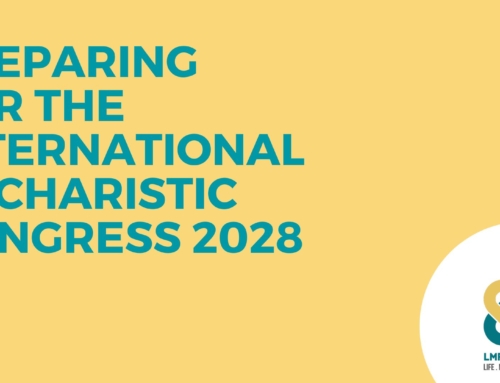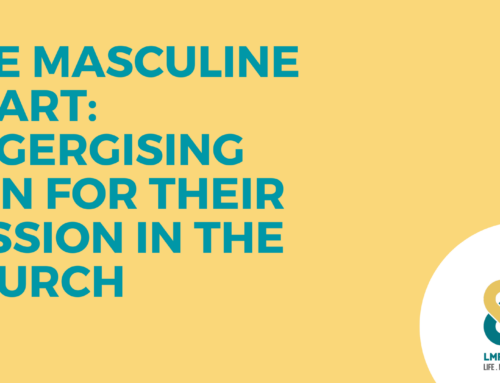This booklet has been primarily written for engaged couples who have decided to marry within a Catholic ceremony. It is hoped that married couples and single persons who read it will also find some benefit in reading it.
The Trinity as the Model of Married Loving
In the marriage ceremony, the celebrant asks the couple who are seeking to receive the Sacrament of Matrimony questions:
- Have you come here freely and without reservation to give yourselves to each other in marriage?
- Will you love and honour each other as man and wife for the rest of your lives?
- Will you accept children lovingly from God, and bring them up according to the law of Christ and his Church?
You can see how these questions relate to the nature of love as revealed in the life of the Trinity:
- Each of the couple is asked if they truly want to make a gift of themselves to the other, if they are willing to reveal all the truths about themselves to the
- They are asked, in effect, do they want their relationship of love to become ever more like the loving relationships in the Holy Trinity. Do they have as their aim a total loving presence to each other?
- Because of human limitations, the affirmation that they wish to be totally self-gifting and self-revealing is a statement of a willingness to continue the journey of ever deeper self-gifting and self-revelation which will only be completed in heaven.
- Each of the couple is asked if they intend to remain in the mutually self-gifting and self-revealing relationship of love, regardless of whatever happens in the course of the
- When each of the couple affirms the intention to remain in the loving relationship no matter what, each is implicitly acknowledging that, because of their individual imperfection and tendencies to sin, there will be times when the exchange of love will be reduced and there will feelings of rejection, being misunderstood, of being frustrated and of hurt.
- Each is saying in effect “I am aware that there will be times when I will experience being hurt by you. I will do my best to understand and forgive you, and to help you overcome your weaknesses. There will times when you will experience being hurt by me. I am trusting that you will do your best to understand and forgive me, and to help me overcome my weaknesses.”
- Each is implicitly acknowledging that repentance and forgiveness are essential aspects of a loving married relationship. When we acknowledge our faults and experience that we are loved in spite of them, we gain in strength and courage in our attempts to overcome them. We grow as loving persons.
- These attitudes mirror God’s attitude to us. God is ever willing to forgive us and to help us to grow in relationship with Him and with other people, if we are willing to admit our sins and to resolve, with His help, to live more loving lives.
- The more each of the spouses grows in individual love of God, and experiences His forgiveness and strengthening love, the greater will be the capacity to bring love and forgiveness into their married relationship. The couple’s love for each other is empowered by the love of God in each of them.
- There will, in the course of the marriage be times when one spouse will have to draw the other’s attention to a fault or weakness in the other, because that fault or weakness is blocking the exchange of love. Drawing of attention to faults and weaknesses must be done with love and have as its main aim helping the other person to increase their capacity for truly loving and hence increase their capacity for individual peace and happiness
- The relationship between the spouses is one of two equal persons. Each will have individual strengths and weaknesses but, as persons they are equal in dignity. One is not in charge of the other. They may agree, on occasion, that one will take the lead in dealing with a particular issue because of greater knowledge and experience relating to the issue. Such an agreement does not diminish the fundamental equality of the spouses.
- The openness to being parents and to ensure that any children are introduced to God’s love for each of them as individuals is an essential part of married
- The very nature of love is that it cannot be self-contained within the lovers. The loving relationship between the Father and the Son in the Trinity produces the Holy Spirit. The Trinity of Persons wants to share love with us. Love is not
- The Catholic Church regards the use of contraceptives as wrong basically because their use is a denial of the full self- gifting which is the essence of true
- In contraceptive sexual intercourse those using contraceptives are saying “I do not give my entire self to you. I deliberately withhold my fertility. I will not allow the love of God to flow freely between us and create another person. I deliberately inhibit the natural flow of true love which seeks to flow from the lovers to other persons
- The love that flows within a family is not meant to be confined to just the members of that family. It is meant to flow out to others, relatives, to neighbours and to the general community. Members of a family are meant to be open to receive the love of others outside of the immediate
- The result is that the family members contribute to building up a general community of love which will be perfected in
The Presence of God in the Relationship between the Married Couple
Unless we have rejected God by committing a serious sin and have not been truly repentant, we live in a truly loving union with God and are, in a mysterious way, caught up in the very life of the Trinity.
In deciding to receive the Sacrament of Matrimony within the Catholic Church, the couple is explicitly asking God to be present within their loving married relationship. They want the love which flows between them to be caught up in the flow of love among the Persons of the Trinity. When they are loving each other, that loving is infused with the love of the Trinity.
The embrace of spousal love in sexual intercourse is the greatest possible intimacy in marriage. The two not only are united physically becoming, as it were, one flesh. They are united psychologically, emotionally and spiritually. The embrace can include not only the experience of receiving and giving of physical pleasure but also the joy of feeling loved, of giving love, of acceptance and of forgiveness. Loving presence is experienced very deeply.
Now if God is, in some mysterious way, present in each of the spouses, he must be present within the physicalness of married sexual loving. God must have some kind of presence in the hands which caress, the lips which kiss and the genitals which unite. There are married couples who tell of the having, on occasion, an awareness of the presence of God whilst they were engaged in passionate love-making.
The afterglow of God-filled sexual loving gives strength to cope with the challenges and stresses that life inevitably brings. Even when they are not physically in the same place, spouses can feel spiritually in touch with each other and with God.
Conclusion
The aim of this booklet has been to articulate the theological/spiritual vision which underpins the content of CatholicCare Parramatta’s Pre- Marriage Course.
The aim of the course is to provide information so that couples will have awareness of the types of problems which are likely to arise in the course of a marriage, and have awareness of how such problems might be prevented from developing, and how such problems can be resolved should they occur.
It is our belief that the awareness of how to prevent problems arising and of how to deal with them should they arise is enhanced by placing that awareness within a spiritual context.
Ray Reid 2011
References
John Paul II: The Theology of the Body: Human Love in the Divine Plan, Pauline Books, Boston,1997.
Durkin, Mary: Feast of Love: Pope Paul II on Human Intimacy, Loyola University Press, Chicago, 1983.
Smedes, Lewis, B: The Art of Forgiving: When You Need to Forgive and Don’t Know How, Random House, New York, 1996.
West, Christopher: The Theology of the Body Explained: A
commentary on John Paul II’s “Gospel of the Body”, Pauline Books, Boston,2003.
Reid, Ray: Marital Intimacy-Revelation and Gift”, Australasian Catholic Record, Vol LXVII, no.2,(1990), pp157-164





